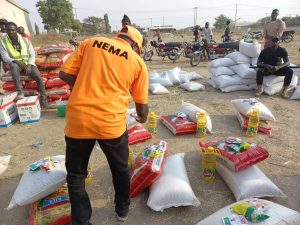UN: $159 Million Needed In Six Months For Humanitarian Interventions In Borno, Adamawa, Yobe …Says 30m People At Risk Of Acute Food Insecurity In Nigeria
By Bukar BOLORI
The United Nations has decried that across Nigeria, over 30 million people are at risk of acute food insecurity, stating that US$159 million is needed for humanitarian interventions in Borno, Adamawa and Yobe in the next six months.
Speaking at the launch of the 2025 Lean Season Response Plan for Borno, Adamawa and Yobe states, the UN Resident and Humanitarian Coordinator in Nigeria, Mr. Mohamed Fall said there is urgent call for intervention because there has never been a time of greater need for us to demonstrate our support for the people we serve than right now.
He decried that: “Humanitarianism is under threat; solidarity is in short supply and lack of resources are putting millions at risk. Many of them children, whose lives can be lost.
“Hope that if we act fast, we will save the lives of already vulnerable people whowe know will struggle to feed themselves in the coming months.“Across Nigeria, over 30 million people are at risk of acute food insecurity. Manyare mothers who are forced to forgo meals to feed their children. Families forcedto flee conflict. People grappling with poverty.
“In the BAY states alone, we estimate that 4.6 million people will be acutely foodinsecure during the lean season.In Borno, Adamawa and Yobe states, 1 million children under the age of five areat risk of life-threatening severe acute malnutrition. This is double the number ofchildren that were impacted last year and more than a quadrupling in less thanfive years.
“The threat to their young lives could not have come at a worse time.
“Lifesaving programmes are shrinking or closing altogether due to dramatic cuts infunding for humanitarian operations. A lot of capacity has disappeared, and weare now only focusing on lifesaving activities and our ability to deliver.Everything that is in the plan is strictly lifesaving compared to previous years.”
He lamented that: “The gains that we have made in the last few years in preventing malnutrition and increasing our joint capacity to treat malnourished children is being wiped out. Our ability to save these children is hampered by the lack of resources.
“In Borno, Adamawa and Yobe states, 70 per cent of health service provision and 50 per cent of nutrition services have been affected.
“Resources are needed now, not tomorrow or next week to ensure that we canmaintain capacity and the pipelines of essential commodities to save lives.Funding cuts have impacted access to lifesaving nutrition services for at least 40per cent of the 2.3 million children and women in need of these services acrossthese three states.”
He also decried that: “The needs are huge.Funding is woefully low. But we are not helpless. We must keep hope alive because the cost of inaction will be catastrophic.This is why today we are launching a six-month lean season operational responseplan requiring US$159 million for Borno, Adamawa and Yobe. This plan is drawnfrom the 2025 Humanitarian Needs and Response Plan (HNRP) that we jointlylaunched with the Minister of Humanitarian Affairs in January.”
He noted that these priorities are the priorities within the priorities. The priorities, as I said, are time sensitive, adding that: “Critical nutrition pipelines need to be replenished urgently. Funding is desperately needed to maintain the infrastructure for treating life-threatening malnutrition, such as stabilization centres and outpatient therapeutic feeding centres.”
He said: “Funding to the lean season plan will help us and our partners – especially local partners – to immediately scale up food assistance, health support, nutritioninterventions, integrated water and sanitation hygiene support and protectionservices for 2 million of the most vulnerable people.”
He insisted that: “This plan’s success depends on us doing things differently. We will scrutinize every single dollar so that it is put to the most efficient and impactful use. We must embrace local solutions. We must mobilise resources for locally owned andGovernment-led solutions and strategic partnerships. We have seen what is possible when we act together. Local organisations have stepped up in inspiring ways. But they need urgent funding and resources from all of us – Member States, Government, the private sector, and donors for critical interventions.
“We are also looking to the Government for leadership, the private sector, andemerging donors to work with us to urgently address the alarming humanitarianneeds in this new humanitarian funding landscape. Our response must be swift and impactful. Our compassion and solidarity must be steadfast. We must not fail, as the consequences are too awful to contemplate.”
On his part, the Minister of Humanitarian Affairs and Poverty Reduction,Professor Nentawe Yilwatda, said:“Today, we are not simply launching a plan. We are issuing a call — a call to conscience, to collaboration, and to coordinated action in the face of an urgent, preventable crisis.
“We gather here for Borno, Adamawa, and Yobe — states whose people have endured more than their fair share of hunger, loss, and uncertainty. In the upcoming lean season, projections show that millions are at risk of severe food insecurity, with many children facing the spectre of malnutrition, some acutely. Behind every data point is a mother skipping meals so her children can eat, a farmer whose fields are dry and unsafe, and a child whose physical and cognitive development is already compromised by hunger.”
He noted that: “This is not just a humanitarian issue — it is a moral one. It is a challenge to the promise of the Renewed Hope Agenda. And it is a test of our capacity to act not when it is convenient, but when it is necessary.
“Today, we launch a Multisector Plan that brings together food assistance, nutrition, health, water and sanitation, protection, agriculture, and early recovery — because no single sector can fix hunger, and no single intervention can break the cycle of crisis.
“This plan is homegrown but evidence-based. It is built on lessons from the past, but powered by innovation and foresight.We are leveraging the National Social Register, geotagged to enable real-time vulnerability mapping. We are integrating digital targeting to reach displaced persons and host communities more efficiently and transparently. And we are anchoring the plan in local leadership because ownership at the state and LGA level is not optional — it is essential.
“Let me be clear: the Federal Government will lead from the front — not just in coordinating this response but in ensuring alignment with national policy, clarity of roles, and accountability of outcomes. We will support state structures, empower frontline actors, and ensure every kobo is traceable and impactful.”
He assured that: “But this plan is not just about structures and strategies. It is about a promise — that no child in Borno, Adamawa, or Yobe should have to sleep hungry when the world has enough food; that no mother should lose a child to a condition we know how to treat, and that dignity must never be a casualty of conflict or poverty.”




